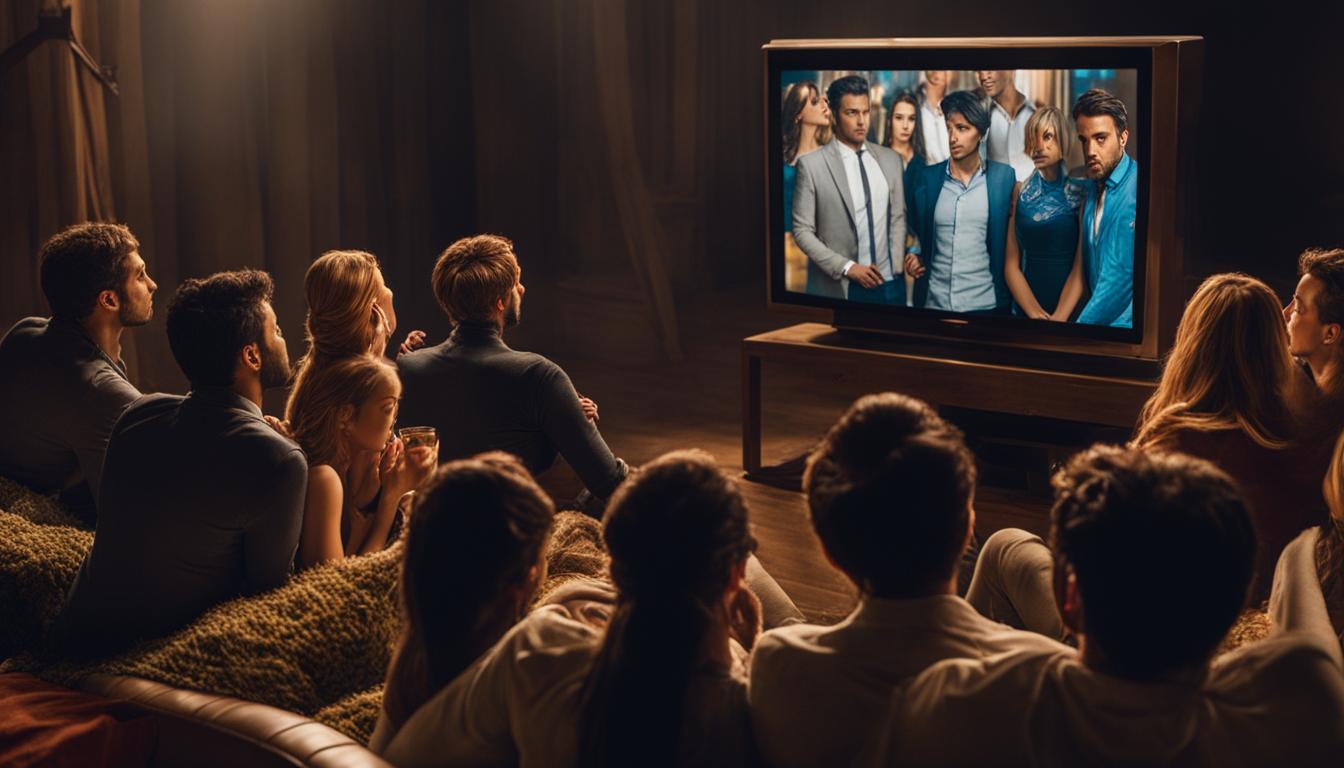The landscape of television has long been dotted with the towering presence of scripted shows, but in recent decades, a new titan has emerged: reality TV. This genre, characterized by its unscripted drama and the authenticity of its characters, has rooted itself deeply in the soil of popular culture. It's the unpredictability of reality television that snags viewers' attention, the raw emotional journeys, and the often improvised scenarios that speak to the human experience, ensuring a captivating allure that scripted dramas can scarcely compete with.
The very essence of reality TV's captivation lies in its ability to mirror the chaos and unpredictability of everyday life. Each episode promises an uncharted voyage through the joys, conflicts, and revelations of relatable individuals, offering audiences a break from the meticulously scripted narratives of traditional TV. It's this authentic nod to the vicissitudes of life that transforms ordinary viewers into loyal fans, keen on drinking in the drama that reality TV expertly distills.
- 1 The Allure of Reality TV in Modern Entertainment
- 2 Reality TV's Evolution and Dominance in the Entertainment Industry
- 3 Behind the Scenes: How Reality TV is Produced
- 4 Cultural Impact: Reality's Influence on Television Culture
- 5 Entertainment Industry Insights: Reflecting on Reality TV's Journey
- 6 Reflecting on the Unyielding Appeal of Reality TV
The Allure of Reality TV in Modern Entertainment
In a landscape overflowing with scripted content, reality TV trends continue to redefine modern entertainment with their gripping storylines and heightened viewer engagement. At the heart of this phenomenon is an undeniable connection viewers feel with both the participants and the unfolding real-life narratives—forging a uniquely compelling form of visual storytelling. Let's dive into the elements that make reality TV a staple in today's television culture.
Examining the Escapism Reality Shows Provide
For many, the beckoning call of reality programs lies in their ability to transport viewers away from the rigors of daily life, delivering much-needed escapism. Unlike traditional dramas, these shows invite audiences into worlds sometimes fantastical, other times raw and competitive, but always outside their usual experience. From the exotic locales of Survivor to the glamorous lifestyles on Keeping Up with the Kardashians, reality TV offers a retreat into lives and situations that captivate and mesmerize.

Authenticity and Relatability: Why Viewers Tune In
Contrasting heavily with their scripted counterparts, reality TV shows shine with an aura of authenticity that resonates with diverse demographics. It's this genuineness, whether in the struggles of budding entrepreneurs on Shark Tank or the heartfelt connections made in The Bachelor, that viewers find relatable. Characters on screen often reflect the very same triumphs and tribulations of the audience, thus strengthening bonds and loyalty to these programs.
The Psychology Behind the Reality TV Obsession
But why do these shows grip audiences so tightly? The explanation can partially be found within the complex psychological interplay of viewer engagement and the unique landscape of TV trends. Reality TV feeds our innate curiosity about the human condition. The spontaneous nature of unscripted content offers unpredictability, a thrill akin to live sports, keeping fans on the edge of their seats. Furthermore, the phenomenon of parasocial interaction, where viewers develop a one-sided bond with reality stars, adds to the obsession, making reality TV a powerful force in modern entertainment.
- Escapism as a draw for audiences in search of new experiences
- Authenticity that mirrors viewer's own lives, enhancing relatability
- Psychological intrigue through unpredictability and parasocial relationships
Reality TV's Evolution and Dominance in the Entertainment Industry
The landscape of modern viewing has been irrevocably changed by the advent of reality television. The history of reality TV is as colorful as the programming itself, with its origins brilliantly reflecting society's changing tastes and the dynamic nature of the entertainment industry. What began as a novel experiment in presenting unscripted life has evolved into a multifaceted genre that dominates screens worldwide.
The timeline of reality television's ascendancy is marked with significant milestones. The genre took its first breath with candid shows like Candid Camera, evolving through televised competitions such as Survivor and personality-driven formats like Keeping Up with the Kardashians. As the tv industry evolution marched on, the formats diversified, capturing every nuance of human experience from the mundane to the extreme.

“Reality TV has become a mirror reflecting and shaping our cultural zeitgeist, transforming viewers from passive observers to engaged participants.”
Television networks and producers quickly recognized the genre's potential, capitalizing on its low production costs and high viewer engagement. However, the true power of reality TV lay in its ability to adapt. The ever-changing entertainment industry trends have shaped reality programming just as much as it has contributed to these trends, creating a symbiotic relationship between viewer demand and content supply.
- Early formats highlighted competition and survivalist elements, laying the groundwork for an era of reality game shows.
- Day-in-the-life reality shows expanded the focus to personal narratives, creating an intimate bond between viewer and participant.
- Talent searches curated a new breed of celebrity, often propelling unknown individuals into the spotlight overnight.
- Social experiment shows tackled topical issues, steering public discussions and perceptions.
In essence, the evolution of reality television is a telling chapter in the ever-unfolding reality television history, demonstrating the genre's chameleon-like quality to remain relevant. From unscripted entertainment to structured reality and beyond, the genre persists not just as a programming option, but as a significant cultural force within the tv industry evolution and broader entertainment industry trends.
Behind the Scenes: How Reality TV is Produced
The production process of a reality series is more complex than viewers might initially believe. Each step is designed to maximize the reality tv impact on audiences and cement its significance in television culture. The crafting of these shows involves a blend of strategic casting, precise editing, and subtle producer intervention to ensure that the finished product is both engaging and resonant.
Casting: The Art of Finding the Perfect Reality Star
Finding the ultimate cast for a reality series is crucial to its success. This meticulous process involves searching for individuals who possess the right mix of personality traits that guarantee on-screen chemistry and conflict. Producers seek out dynamic personalities who can be both relatable and provocative, ensuring a compelling viewer experience crucial for reality series production.

Editing Techniques That Heighten Drama and Conflict
Editing is where the narrative of a reality show is truly sculpted. Hours of footage are whittled down to the most enthralling moments, often enhancing drama to capture audience attention. Techniques like cross-cutting and music overlay are employed strategically to heighten tension or hint at emerging conflicts, pivotal in shaping the television culture around these series.
Producers' Influence: Scripting the ‘Unscripted'
Though reality shows are often believed to be purely spontaneous, producers play a significant role in guiding the storyline. From providing prompts in interviews to setting up scenarios that encourage dramatic interactions, there is a delicate balance between constructing reality and capturing it candidly. It's this careful orchestration that generates authentic-seeming moments that resonate with audiences, further showcasing the impact reality tv has on both participants and viewers alike.
Cultural Impact: Reality's Influence on Television Culture
The landscape of television culture has experienced substantial changes, heavily influenced by the expanding reach of reality television. This genre's pervasive impact has modified how viewers engage with media, ushering in new paradigms of popularity and social norms. Below, we dive into the multifaceted ways in which reality TV has reshaped the cultural fabric of entertainment.
Reality Stars as Influencers and Celebrities
Reality TV's rise has enabled its stars to transform into prominent social media influencers and celebrities. Names like Kim Kardashian and Gordon Ramsay have become synonymous with both television success and personal branding empires. This phenomenon underscores the significant reality stars influence, where individuals previously unknown to the public achieve status and fame, often rivaling that of traditional movie stars and musicians.
Reality Programmes and Their Role in Shaping Social Norms
As reality programmes infiltrate living rooms around the world, they also contribute to television culture changes by reflecting and even defining new social norms. Shows like ‘The Bachelor' and ‘Survivor' not only entertain but also subtly dictate societal standards of romance, competition, and success. They encourage audiences to accept varied behaviors and lifestyles, expanding the scope of what is considered mainstream.
The Ripple Effect of Reality TV on Other Genres
The reality tv impact is so profound that it has caused a ripple effect across other television genres. Scripted series now often incorporate reality TV's confessional style and candid camera work to appeal to viewers accustomed to unscripted formats. This cross-pollination exemplifies reality TV's extensive reach, as it continues to influence narratives and presentation styles beyond its own genre.
- Introduction of reality elements into scripted shows.
- Increased public engagement through social media platforms.
- Growth in offshoot genres like docu-reality and competition shows.
From reshaping celebrity culture to influencing other television formats, reality TV's legacy is indelible, continuously forging new pathways within the entertainment industry. Its widespread appeal and adaptability make it a cornerstone of modern media, proving that the effects of reality television extend far beyond the screen into the fabric of contemporary culture.
Entertainment Industry Insights: Reflecting on Reality TV's Journey
In the landscape of modern television, the entertainment industry insights reaffirm that reality TV is not a fleeting craze but a genre deeply ingrained in popular culture. This article has explored the mechanics that make reality shows a source of captivation for audiences worldwide, from relatable life scenarios to thrilling, unscripted drama. The reality shows impact analysis reveals that these programs have profound influences, shaping perceptions and often setting new precedents in the world of entertainment.
The television trends forecast suggests that reality TV will continue to evolve with technological advancements, potentially introducing more interactive and immersive viewing experiences. This will not only enhance audience engagement but also provide new opportunities for advertisers and content creators within the entertainment industry. We might anticipate an increased blending of reality content with other digital platforms, further expanding its reach and significance.
“As streaming services continue to grow, so too does the potential for reality TV to adapt and thrive in an ever-changing digital environment.”
Finally, while reality TV has sometimes been critiqued for its influence on social values, it remains a powerful tool for storytelling and connection. As we look to the future, the continued analysis of this genre will be essential to understanding its role in both reflecting and shaping our society. The entertainment industry insights obtained from reality TV underscore its undeniable impact and the anticipation of further growth and innovation.
Reflecting on the Unyielding Appeal of Reality TV
In the landscape of modern entertainment, reality TV has emerged as an undeniable phenomena, captivating audiences with its raw unscripted drama and authentic depiction of human experiences. This mesmerizing form of television has garnered a steadfast following by providing a mirror to society, reflecting the intricacies of life and the complexities of human relationships. As we explored through various sections of this article, the allure of reality TV lies in its ability to offer escapism, its relatable content, and the psychological thrill it provides to viewers. The evolution and production processes behind these shows reveal a carefully crafted balance between spontaneity and narrative control that keeps audiences engaged and loyal.
Moreover, the cultural impact of reality television is profound, influencing not just television culture but societal norms at large. Reality stars ascend to celebrity status, wielding influence that transcends the screen and impacts fashion, language, and lifestyle choices. The genre's ripple effect on other television formats is evident as it pioneers new styles of storytelling and audience engagement. Looking back at the journey of reality TV, from its nascence to its current prominence, we see a trend that is not only reshaping the entertainment industry but also the very fabric of pop culture.
In summary, the viability of reality TV as a staple in entertainment is clear. It reflects the evolving tastes and values of audiences while consistently adapting to the ever-changing digital landscape. As the television industry continues to evolve, reality TV stands as a testament to the enduring human interest in storytelling that is unscripted, unpredictable, and utterly compelling. The future, no doubt, holds new advancements and transformations for this genre, as it continues to captivate and influence millions worldwide.
Contents
- 1 The Allure of Reality TV in Modern Entertainment
- 2 Reality TV's Evolution and Dominance in the Entertainment Industry
- 3 Behind the Scenes: How Reality TV is Produced
- 4 Cultural Impact: Reality's Influence on Television Culture
- 5 Entertainment Industry Insights: Reflecting on Reality TV's Journey
- 6 Reflecting on the Unyielding Appeal of Reality TV
